11 Centenarian Secrets for a Long and Happy Life
Ready to add years to your life? Start with these simple tricks.

As you are aware, time is constantly passing us by. In fact, many would agree that time is passing us by way, way too quickly. Whereas you can’t halt the passage of time, what you can do is take measures to prolong your time on this earth.
Now, whether you’re of the belief that a little of what you love does you good, a lot of what you love does you good, or everything in moderation, there are definitely lifestyle and dietary choices we can make to potentially help us to extend our time on this earth.
The truth is that there is no clear way of living to 100 or beyond. We all make different choices, we all have different circumstances, and nothing in life is certain, except for death and taxes of course.
With that said, you can take certain measures and steps to increase your chances of seeing 100, if not more in fact. Here’s a look at a few secrets from centenarians themselves, which may increase your chances of seeing 100.
Centenarian Secrets
Before longevity and anti-aging gurus like Bryan Johnson and Peter Attia came into the spotlight, many people from all over the world have surpassed the age of 100. They didn’t have the technology or the money like today’s longevity gurus.
What made them live to 100? Let’s find out.
1. Adopt a positive mental attitude
The first tip on our list comes from Emma Morano from Italy, who lived to 117 years old. When asked about the secret to her longevity in 2013, she revealed that while she ate three eggs a day, occasionally enjoyed homemade grappa and chocolate, “above all, I think positively about the future.”
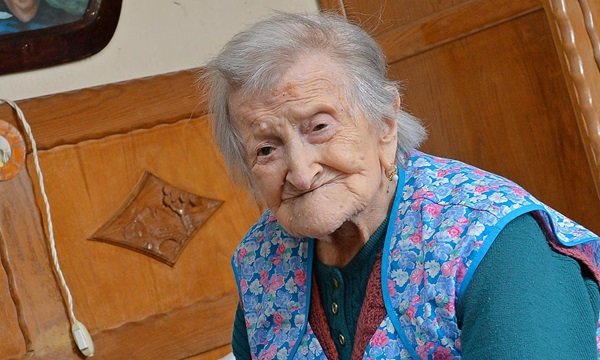
Even at 115, she was still living independently in her own home. In 2016, she added that staying single had contributed to her long life – suggesting that avoiding relationship stress may have been beneficial. Her ability to maintain an optimistic outlook and independent lifestyle seems to have been key factors in her remarkable longevity.
According to Dr. Luigi Ferrucci, Scientific Director of the National Institute on Aging, “Studies consistently show that optimistic people live longer and healthier lives.” This observation is supported by robust research.
A large-scale study of over 159,000 women found that those in the highest optimism quartile had 5.4% longer lifespans compared to the least optimistic women. This pattern held across racial and ethnic groups, with Black women showing the strongest association (7.6% longer lifespan). Most remarkably, women with the highest optimism levels were 10% more likely to reach exceptional longevity (living to 90+ years).
Additional research from the National Institute on Aging confirms that optimism links to both longer lifespan in diverse populations of women and better emotional health in older men.
A separate study of aging men found that optimists experienced higher daily positive emotions and encountered fewer stressful situations in their daily lives. Rather than simply responding better to stress, optimistic people may actually structure their lives to avoid unnecessary stressors—a powerful longevity strategy.
2. Vodka Martinis
Andy Medema, who hailed from Illinois, lived to the impressive age of 101. What was his secret? Well, according to Andy, the key to longevity was vodka (and one of Emma’s habits from above was homemade grappa..).

Specifically, a vodka martini a day. Only one drink, though, as moderation is important. Andy said that he’d enjoy a vodka martini each night and that he believed that that beverage, coupled with NOT smoking, and a lifetime of hard work, helped him to live for so long. Besides, if it’s good enough for Andy and James Bond, it’s certainly good enough for us.
While a daily vodka martini might seem counterintuitive to longevity, there could be something to Andrew’s ritual. The relaxation and enjoyment from his nightly drink might have helped reduce stress, which we know is harmful to health.
Also, moderate alcohol consumption has been associated with certain cardiovascular benefits in some studies. [1]
However, I must emphasize that “moderate” is the key word here – one drink, not several. The ritual and satisfaction of his martini might have contributed more to his mental wellbeing than any direct physical benefit from the alcohol itself.
3. Hard work
Speaking of hard work, our next tip comes to you from Ruby Duncan. Ruby from Ohio lived to 104. According to Ruby, she believed that one of the secrets to longevity was hard work. When you think about it, both Ruby and Andy, had a point. Ruby worked hard for virtually all of her life.

Image credit: indeonline.com
She grew up on a farm and would get physically involved every single day. She grew up on a chicken farm and looking after over 1000 chickens certainly required a lot of work. Hard work is great for the mind, and if it is physical labor, it’s great for the body.
Working hard will keep your brain sharp, it will keep boredom at bay, and it will help you to burn calories, manage your weight, and strengthen your heart and major organs.
Who do you think would likely live longer?
Somebody that sat on their backside all day, every day, doing nothing, or somebody that worked hard for countless hours each week?
This is actually strongly backed by modern science as well. A sedentary lifestyle is one of the worst things for human health. According to research published in the Lancet, physical inactivity is responsible for 9% of premature mortality worldwide.
Our bodies evolved to move, work, and be active. When we sit for extended periods, we experience metabolic disruptions, reduced muscle mass, and increased inflammation – all factors that accelerate aging. Ruby’s lifetime of physical labor kept her body functioning as nature intended, which likely contributed significantly to her impressive lifespan.
4. Smaller Food Portions
We understand that a healthy diet is important, and we’ll be looking at that a little later on. For now, though, we’d instead like to look at portion sizes.
Nowadays there is all manner of fad diets designed to promote weight loss, yet decades ago, in the 1940s and 50s for example, waistlines were much smaller. When spoken to about diets and portion sizes, many centenarians were critical of the larger portions that have become the norm in modern society.
Lillian Cox, for example, lived to 107, despite admitting to becoming ‘quite heavy’ when in her 50s. She mentioned how she was able to trim off the pounds by simply cutting back on the amount of food that she ate, and by following smaller portions.
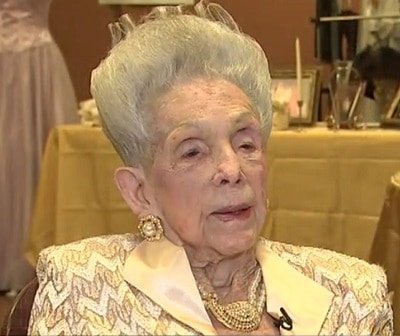
Put simply, many people that have lived to 100 or more, believe that portion sizes nowadays are too big and that we should cut back. When you stop and think about it, they probably had a point.
My own grandmother used to tell me that I should always stop eating just before feeling completely full. At the time, I thought she was just being old-fashioned, but now it makes perfect sense.
This practice of eating until you’re about 80% full actually has a name in Okinawan culture – “hara hachi bu.” By not overeating, you’re reducing the metabolic load on your body, decreasing inflammation, and potentially activating longevity pathways.
Science has shown that calorie restriction (without malnutrition) is one of the most reliable ways to extend lifespan in nearly every species studied. Perhaps our grandparents were onto something profound in their simple wisdom about moderation.
5. Exercise
This should come as no real surprise to learn, but exercise is indeed considered hugely beneficial when it comes to leading a healthy and prolonged life. Exercise promotes all manner of health benefits, that truthfully would take us forever to list each one.
According to 101 Louise Caulder, though, exercise was one of her keys to living past 100. Louise said that she would not leave her bedroom before performing at least 30 minutes of gentle exercise in the form of stretching.
She would also walk a mile per day on average, and play bridge 3 times per week to help exercise her brain as well as just her body. Just because you are elderly is no reason not to exercise.
There are even the Senior Games, which is like an elderly version of the Olympics, that regularly sees contestants taking part, despite being in their 80s, 90s, and even 100s.
Another inspiring example is Fauja Singh, who became the first centenarian to complete a marathon at age 100. When asked about his secret to longevity, Singh simply stated, “I run while talking to God.”
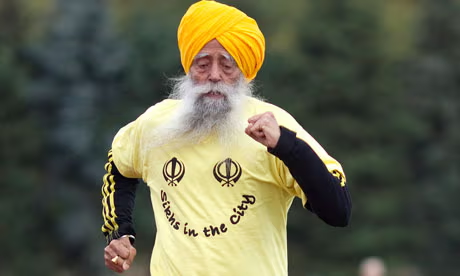
Japanese centenarian Hidekichi Miyazaki, nicknamed “Golden Bolt” after Usain Bolt, was still competing in sprinting events past age 105. He claimed his daily exercise routine, which included 100-meter sprints, was essential to his long life.
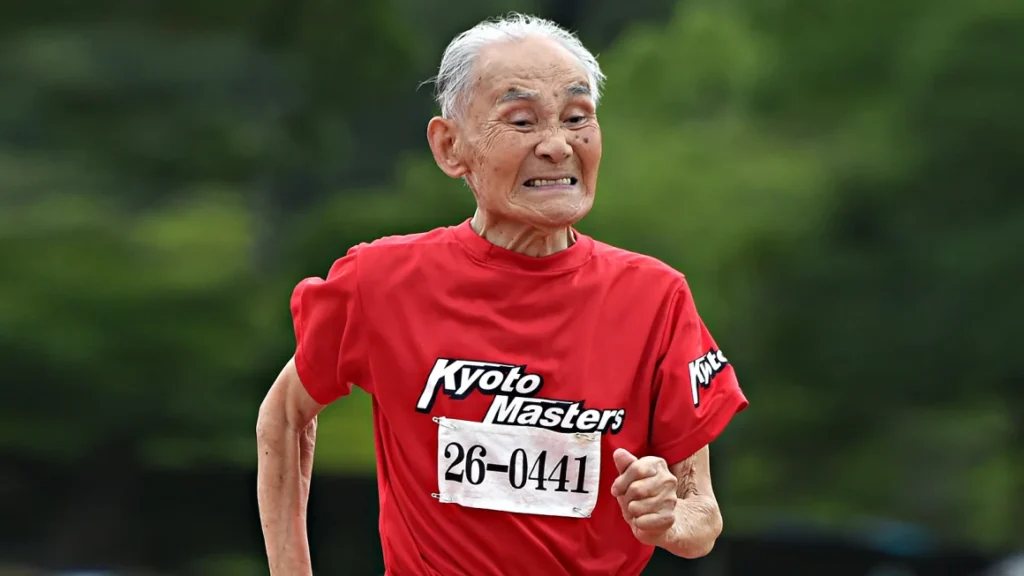
These centenarians demonstrate that it’s never too late to stay active, and that consistent, appropriate exercise is likely one of the most powerful tools for extending not just lifespan, but health span as well.
6. Lead a healthy lifestyle
There is a lot to be said for clean living, and it turns out that clean living and leading a healthy lifestyle could be one of the secrets to longevity.
Walter Breuning from Montana, who lived to 114 years old, attributed his long life to following a disciplined lifestyle.
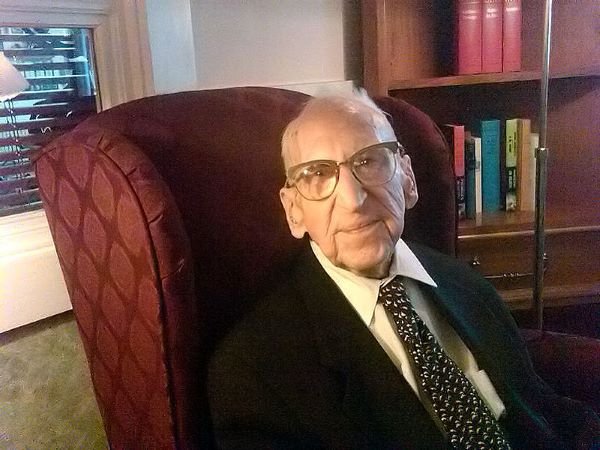
He ate just two meals a day (intermediate fasting), worked as long as he could (until age 99!), and helped others through charity work. “If you keep your mind and body busy, you’ll be around a long time,” he often said. Breuning believed that following basic health principles and avoiding unhealthy habits were key factors in his exceptional longevity.
What’s more, the vast majority of people that live to 100 or more, have never smoked. Those that did smoke stopped earlier on in life. Many others also never binge drank, and would instead either not drink alcohol at all, or they’d simply enjoy one or two drinks in moderation.
Jeanne Calment, who holds the record for the longest confirmed human lifespan at 122 years, was known for her moderate lifestyle. Although she did smoke occasionally until age 117 (not recommended!), she practiced moderation in most areas of life.
Another example is Christian Mortensen, who lived to 115 and advised others to “Friends, a good cigar, drinking lots of good water, no alcohol, staying positive and lots of singing will keep you alive for a long time.” The common thread among most centenarians isn’t perfection in their habits, but rather consistency and moderation – avoiding excesses while maintaining a generally healthy approach to life.
7. Drink tea
No prizes for guessing where the next centenarian on our list comes from. Yep, Margaret Young, and yes, that really is her name, hails from England. The same England that is synonymous with cups of tea. Margaret lived until 110 years old, and she claimed that one of her secrets to longevity is to drink plenty of tea. She could actually be onto something.

image source: https://www.chad.co.uk/news/sutton-woman-celebrates-108-years-of-life-1-9409662
For the real health benefits, though, we recommend drinking cups of green tea, as it is loaded full of antioxidants in the form of catechins. The most prominent is EGCG, or Epigallocatechin gallate, which is a very powerful antioxidant believed by health experts to provide powerful anti-cancer benefits.
The antioxidants and nutrients in tea help to strengthen the immune system and keep your cells strong and healthy, which in turn may help to promote longevity. So, put down the sugary soft drinks and drink a delicious cup of tea instead.
8. Healthy diet
A healthy diet is another critical component of any healthy living regime. We don’t have this tip from just one person. Instead, we’re heading over to Okinawa, Japan. Here, it is not uncommon for people to easily live to 100. Experts believe that it is the diet here that plays such a vital role in the indigenous people’s life expectancies.
The diet consists of a lot of fish, relatively low amounts of calories, plenty of whole grains, vegetables, and moderate amounts of fats. The fats that are consumed are all-natural and largely come from oily fish, nuts, seeds, and foods such as avocado.
If you want a rough ratio of macros, 85% of calls come from carbs, 9% from protein, and 6% from healthy fats. In truth, any diet rich in vitamins, minerals, fiber, antioxidants, healthy fats, and other nutrients, whilst being all-natural and free from anything processed or artificial, is going to be beneficial and could potentially increase your chances of living to 100 or beyond.
Ushi Okushima, who lived to 108 in Okinawa, attributed her longevity to her traditional diet. Her daily meals consisted primarily of local vegetables like bitter melon (goya), sweet potatoes, and small amounts of fresh fish. She rarely ate meat and consumed very little processed food.
Another Okinawan centenarian, Kamada Nakazato who lived to 102, maintained a garden well into her 90s, consuming fresh vegetables she grew herself daily.
The Okinawan diet is particularly noteworthy for being plant-heavy, containing foods with natural anti-inflammatory properties, and being calorie-sparse but nutrient-dense – a combination that modern nutritional science increasingly supports for longevity.
9. Genetics
When it comes to living past 100, we can’t ignore the role genetics play. Hendrikje van Andel-Schipper, who lived to the remarkable age of 115, often credited her long life to “good genes.” Coming from a family where several members lived well into their 90s, she believed her genetic makeup provided a strong foundation for her longevity.
Scientists largely agree. Dr. Thomas Perls, founder of the New England Centenarian Study, found that extreme longevity runs strongly in families. His research shows that siblings of centenarians have a 17 times greater chance of reaching 100 compared to the general population. The study of “blue zones” – regions with high concentrations of centenarians – also reveals genetic clusters that seem to favor long life.
However, genetics is just part of the equation. Researchers estimate that genes account for about 25-30% of longevity factors, with lifestyle choices making up the rest. This means that while good genes can give you a head start, your daily choices still play the most significant role in determining how long and how well you’ll live.
10. Surrounded by People who love you
Social connections appear to be a powerful factor in longevity. Jessie Gallan, a Scottish woman who lived to 109, cited “staying away from men” as her secret (which gave her a good laugh), but more seriously emphasized the importance of her close friends throughout her life. “Having good friends and people who care about you keeps your heart young,” she once said.
The scientific evidence supporting this is compelling. Dr. Robert Waldinger, director of the Harvard Study of Adult Development, which has tracked participants for over 80 years, concludes that “good relationships keep us happier and healthier, period.” Loneliness has been shown to increase inflammation, disrupt sleep patterns, and elevate stress hormones – all of which accelerate aging at the cellular level.
Many centenarians maintain strong family bonds and active social lives well into their second century. These connections provide emotional support, practical help, and a sense of purpose. Whether it’s family, friends, or community groups, meaningful human connections seem to create a protective buffer against the challenges of aging. As one researcher put it, “Social integration doesn’t just influence how long you live, but how well you live.”
11. Having a Purpose
Perhaps one of the most consistent themes among centenarians is having a purpose in life. Jiroemon Kimura, who lived to 116 as the world’s oldest man, woke up each morning with a clear sense of purpose. Until late in life, he continued to help with his family’s farming business, saying “To be useful to others is what makes a life worth living.”
Dr. Victor Strecher, a professor of health behavior at the University of Michigan, has found that having a strong life purpose correlates with reduced risk of Alzheimer’s disease, better sleep, fewer strokes, and generally better health outcomes. Purpose creates resilience and motivation that helps people overcome health challenges and maintain healthy behaviors.
I believe having a purpose works on multiple levels. Psychologically, it gives us a reason to get up in the morning and face each day with optimism. Biologically, it may help regulate our stress response and inflammatory processes. Socially, purpose often connects us with others, reinforcing those vital social bonds. Whether it’s family, community service, creative expression, or spiritual practice, finding and maintaining purpose isn’t just good for the soul – it appears to be good for the body as well. As the Japanese concept of “ikigai” teaches us, finding your reason for being may be one of the most powerful longevity practices of all.
Interesting Reads
For those interested in diving deeper into the wisdom of centenarians, here are some recommended books:
“The Okinawa Program” by Bradley J. Willcox – Details the lifestyle and diet of one of the world’s longest-lived populations.
“The Blue Zones: Lessons for Living Longer From the People Who’ve Lived the Longest” by Dan Buettner – Explores regions where people commonly live to 100 and beyond.
“If I Live to Be 100: Lessons from the Centenarians” by Neenah Ellis – Based on NPR interviews with centenarians.
“The Longevity Diet” by Valter Longo – Combines centenarian studies with cutting-edge research.
“Aging Well” by George E. Vaillant – Insights from Harvard’s groundbreaking study on adult development.
Bottom Line
Do you have family members that are centenarians – or at least closing to be 100 years old? If yes, what are their centenarian secrets? Ask them, and share them with us via the comments system below.
